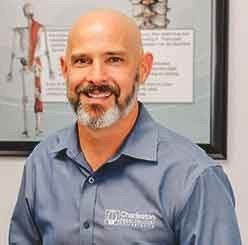
Your spinal cord is made up of vertebrae that are cushioned by small discs. These small discs are located in between each of the vertebrae and act as a shock absorber, provide mobility to the spine, and act as tough ligaments to hold the vertebrae of the spine together. In each spinal column, there is a total of twenty-three discs. If there is a problem with any of the discs, they can cause unique symptoms to occur.
What Causes a Herniated Disc?
You may hear a herniated disc chiropractic office refer to a herniated disc as a bulging disc, slipped disc, or a ruptured disc. No matter how a herniated disc is referred to, it means a fragment of your disc nucleus is pushed out of the annulus into the spinal canal through a rupture or a tear in the annulus. Usually, herniated discs are in an early stage of degeneration.
A herniated disc can appear anywhere along the spine, including the upper cervical spine (the neck area), but are most common in the lower region (lumbar spine). The pain that comes along with a herniated disc all depends on which area of the spine is affected.
As for what may cause a herniated disc, this could be from excessive strain or an injury. In addition, it is natural for discs to degenerate due to the aging process and the ligaments will begin to weaken. In the natural aging process of degenerating discs, a disc can rupture more easily with a twisting movement or a more minor strain.
What are Common Treatments for a Herniated Disc?
Herniated disc chiropractic treatments are a great alternative to those who do not want to undergo surgery or rely on medication to help their symptoms; however, herniated disc chiropractic treatments are not always a first choice but are the safest treatment for your body and will target the cause of your herniated disc while giving it a chance to repair itself. Other treatments focus on symptoms of the herniated disc and do not focus on solving the underlying issue. There is also a chance medication and surgery can add more complications to your body’s overall health rather than helping it.
The most common treatment is medication. Those who suffer from a herniated disc often want fast relief quickly, and medication is only prescribed to make it comfortable – not to correct or heal it. Patients with a herniated disc are usually prescribed with a nonsteroidal anti-inflammatory medication if they are experiencing mild to moderate pain. The medication prescribed may include muscle relaxants or nerve pain medications, such as amitriptyline, pregabalin, tramadol, gabapentin, and duloxetine; this may also include an epidural steroid injection directed to the level of the herniated disc.
The only issue with relying on medication is the side effects that come with it. There are typical side effects commonly seen in medications (nausea, fatigue, vomiting, constipation, dizziness, etc.) that are seen in medications prescribed for those with a herniated disc as well; but besides these common side effects, they could cause more issues for your body in the future if it is depended on:
Amitriptyline can cause long-term effects on your body as it affects your nervous system; some of these long-term effects include insomnia, anxiety, nervousness, and (in rare cases) permanent liver and heart damage.
Pregabalin (Lyrica) can increase the risk of suicidal thoughts or behavior as early as one week after beginning use. It can also cause hypersensitivity shortly after use with reactions such as blisters, hives, rash, wheezing, skin redness, and dyspnea.
In duloxetine (Cymbalta) and pregabalin (Lyrica) medications, they can decrease motor functions, impair judgment, and impair thinking. Both can also cause dizziness, sedation, and drowsiness in some patients.
Patients who use tramadol may experience constipation, dizziness, upset stomach, weakness, and lightheadedness. In addition, tramadol can lead patients to have a dependence on opioids. Overtaking tramadol could cause long-term harm to the brain with an increased risk of mental health disorders like anxiety and depression. In fact, when it comes to consistent opioid consumption (especially tramadol), respiratory depression is a common side effect.
Gabapentin (Neurontin) helps manage nerve pain. Some of the short-term side effects of using gabapentin include loss of balance, problems with vision, changes in mood and temperament, fatigue, and nausea. If a patient is relying on gabapentin and has taken it for a long period of time then tries to quickly stop using it, it will put a lot of stress on the patient’s brain.
The longer a patient takes gabapentin, the more difficult the process will be for cutting back on it. Patients who try to break the habit of taking gabapentin will not only experience the symptoms all over again for the reason in which they began taking gabapentin, but the effects of stopping gabapentin may cause great distress and pain to the patient that they will be tempted to go back on it.
Diskectomy is the most common treatment for patients with a herniated disk located in their lumbar region. For this surgery, the part of the disc causing pressure to your nerve root is removed. Sometimes, depending on the patient’s case, their entire disc is removed. Though there may be a success rate of 90% or higher, there are always chances of complications including nerve root damage, bladder incontinence, bleeding, or dural tears.
Before going under medication or a more extreme option (surgery), it is always best to try healing your body naturally. Not only will this save you money, but natural alternatives can save you from horrible side effects and complications.
What can Herniated Disc Chiropractic Treatments do for me?
First and foremost, herniated disc chiropractic treatments are natural, medication, and surgery-free treatment to help improve the health of your herniated discs and to correct them. Herniated disc chiropractic treatments involve gentle adjustments that are made to improve the current state of your overall health (not just your spinal health).
When there is a misalignment, the nervous system is affected, and this will cause various parts of your body to change. Upper cervical herniated disc chiropractic treatments are actually very beneficial to patients and although the upper cervical area is around the neck, the top two bones of the spine lead how the rest of the spine is aligned.
If one of the top two bones are misaligned, the head will tilt and the rest of the spine, in order to level the head, will begin to distort itself until the head is balanced again. This causes a problem for your discs and will pinch your nervous system – making its performance less than adequate.
If your nervous system is affected, your body will not be able to correct and repair itself; this is a problem for those experiencing a herniated disc. Since a herniated disc comes from an injury or strain in that area, that area should be corrected and the best way to correct the issue is to allow the body to naturally correct it for you by moving it back to proper alignment.
The body has an ability to heal and repair itself, but the reason an upper cervical herniated disc chiropractic treatment is important is so that your body can perform its abilities without the interference of pressure placed on your brain stem (where your entire nervous system is connected); this interference is why the herniated disc is not getting any better.
After experiencing a herniated disc chiropractic treatment, patients have reported feeling changes in their bodies shortly after the adjustments. The reason for this is when a herniated disc chiropractic adjustment corrects the misalignment, the pressure is taken off the brain stem to where brain to body communication will open up and return back to normal (this enables to body to get back to work as fast as it is able now that it is receiving proper signals of what is wrong).
If the herniated disc is severe or has been around for some time, more adjustments are needed to ensure the body is able to regain strength and hold the adjustments longer as your body heals.







Leave a comment